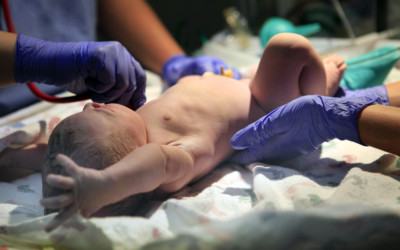How is a Brain Injury Diagnosed in a Newborn Baby?

A brain injury at birth is one of the most serious birth injuries a baby can suffer. Such injuries can affect a child throughout their entire life, potentially impacting how the child develops and grows.
As Halifax birth injury lawyers, we’ve heard from many families who have had a child afflicted by a brain injury. Some result from traumatic births, making the injury obvious on delivery. But other brain injuries result from more subtle causes in utero and may not be obvious immediately at birth or even for some time later.
One question often asked then is: how can I tell if my baby has suffered a brain injury? The answer is complex but here are some general ways a birth injury is diagnosed in a newborn when it isn’t immediately obvious at birth:
1. Observing the newborn:
In the day or days after birth, some parents or medical staff may notice some signs which can suggest the presence of a brain injury. Seizures are a common indicator but these can sometimes be so subtle to not be recognizable. For example, a seizure can reveal itself simply by a baby having a clenched fist or stiff neck.
Babies with brain trauma may also have difficulty focusing their eyes and have difficulty sleeping lying down. They may show an abnormal temperament through excessive crying, problems with feeding or being overly fussy for no reason.
If the baby is showing some of these symptoms in the days after birth, a medical doctor will likely refer the baby for tests to confirm or rule out a possible brain injury.
2. Brain Imaging:
The majority of infant brain damage is diagnosed in Nova Scotia with either an MRI or CT head scan. These tests provide medical images of the baby’s brain and will help a doctor figure out any abnormality. In addition, sometime an EEG will also be used. This is a test that calculates electric pathways within the brain and can tell if these communications are normal.
3. Child Development:
Some brain injuries are so subtle in newborns that neither doctors nor parents will suspect it in the early years. It is well known that assessing the cognitive health of a child under two years of age is more difficult when compared to older children.
For some children, diagnosis of a brain injury practically only happens later in life, as the child develops. Is he or she having trouble hitting the developmental milestones, such as walking or talking? Does the child have excessive emotional outbursts? Or have difficulty concentrating? Or walk with a limp? Such symptoms can lead to the child’s doctor to suspect a possible birth injury and order imaging even years after birth.
It is important to understand that the brain is a complex organ. It has pathways that allow for recovery such that an infant who suffered mild brain damage may have only slight disabilities but can otherwise lead a normal life. Children with these health issues can go on to live productive lives if they are active in physical and occupational therapy.
However more severe brain injuries at birth can be extremely disabling and very difficult for a family to deal with.
If you suspect that your loved one may have suffered a brain injury at birth, and would like more information on possibly helping the child with future care, it is recommended that you speak with an experienced medical malpractice lawyer who may be able to help.





















